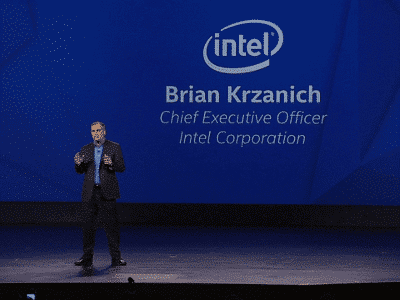

The other night at the Consumer Electronics Show in Las Vegas, Intel CEO Brian Krzanich announced a $300 million Diversity in Technology initiative, meant to demonstrate that Intel is about to take a leadership role in promoting women and visible minorities in the tech sector.
He announced this initiative at the very end of a long presentation, worth watching in full, which outlined the full range of gadgety surprises that Intel will be rolling out over 2015.
But at the end of all that toy-driven goodness, the Diversity in Technology announcement feels significant in ways that surpass the unveiling of cool gadgets.
On its surface, such an announcement seems almost unrelated to technology, and more like a nice-to-have, feel-good socially progressive bit of political correctness, the kind of thing that politicians announce, like curbing carbon dioxide emissions or eradicating child poverty, knowing full well that they’ll never be held accountable for allowing those initiatives to fail.
From that perspective, one can be forgiven for feeling cynical about an announcement to implement full workplace diversity.
The difference here is that Intel is actually going to do this. They’ve established clear benchmarks, along a fixed timeline, and have linked executive pay to their respective departments’ progress in implementing the new hiring practices.
“This isn’t just good business,” said Krzanich. “This is the right thing to do.”
The company’s goal is to reach full representation at all levels within Intel by 2020. The $300 million, to be spent over the next five years, will be spent mainly to improve diversity within “the pipeline” or training programs that supply workers to the company.
The kind of person who rolls their eyes at this announcement would probably argue that quotas never work, and that what you end up with is a substandard workforce shoehorned in to jobs they’re unqualified to do. As if men, and white men in particular, are somehow uniquely qualified for tech jobs or corporate management or late night TV hosting duties.
But to hold this attitude is to ignore that the very purpose of technology, the purpose of innovation, is to improve the world in which we live.
The kind of person who wouldn’t regard a diverse workplace as an improvement over what we’ve currently got is probably also the kind of person who watches Mad Men and thinks, “Ah, the good old days.” Or is perhaps a currently living videogame enthusiast.
“From the threats and harassment that have characterized the debates in the gaming world to the publication of hiring data and statistics in the tech industry, this is a highly relevant issue and one that we all need to address.” – Intel CEO Brian Krzanich
The Consumer Electronics Show is typically presented as a showcase for gadgets and new technologies, almost entirely devoid of real-world considerations.
But gadgets, no matter how free they may seem of ideological value, are never value-free. And neither are decisions about who gets to design, engineer and build them.
There are those, however, who simultaneously value technological progress while denying the benefits of social progress related to technology.
It’s a bizarre paradox. The people who aim to “disrupt” whole industries and ways of life through tech tend to be the very same people who prefer to “let the market decide” when it comes to social change, ignoring the fact that the system we have is hardly the result of any type of “natural order of things”. Not to mention, the benefits of corporate diversity are real.
Where the tech sector has failed at social progress in the past, tending to benefit the developed world and its business class, it stands a chance now to include everyone. Intel should be applauded for its leadership on that front.
But typically what you see at CES are the dudes from Geek Beat entering into a self-described “fugue state” of ecstasy while demoing the Myo wristband from Thalmic Labs.
The Myo is, of course, incredibly cool and a potentially revolutionary technology. That said, the whole atmosphere around CES, as well as around videogames, not to mention start-up culture, conveys the aura of a frat house. Which is great if you’re a bro. And not so much if you aren’t.
So it’s refreshing to hear the CEO of a computer megacorp openly discuss the tech sector’s failings along with his desire to move the needle, pushing the demographics of his workforce closer to reality.
This announcement doesn’t come out of nowhere. Intel was caught on the wrong side of history during last year’s GamerGate scandal. Obviously, Intel has done a little soul searching in the meantime and decided to do right by its mistakes.
If you want to know what the wrong side of history looks like right now, check Gamergate and its supporters’ response to the Intel announcement. (You will feel the need to take a long shower afterwards. Be warned.)
So there can be no doubt that the display of the Feminist Frequency logo behind Krzanich during the announcement was Intel’s way of both distancing themselves from that misstep and making up for lost time.
Feminist Frequency is, of course, run by Canadian-born media critic Anita Sarkeesian, who was the recipient of, to put it mildly, a lot of abuse at the height of the Gamergate scandal for pointing out that women both enjoy playing and making videogames, and that the depiction of women in most games is juvenile.
Thanks @Intel for stepping up to lead by example and take real action in addressing rampant gender disparity within the technology industry.
— Feminist Frequency (@femfreq) January 7, 2015
Krzanich acknowledges as much during his announcement. “A confluence of industry events has brought this issue to the centre stage. From the threats and harassment that have characterized the debates in the gaming world to the publication of hiring data and statistics in the tech industry, this is a highly relevant issue and one that we all need to address.”
Intel’s announcement immediately follows a vivid example of the ways that nerd culture falsely characterizes an atmosphere of political correctness gone mad.
Scott Aaronson, an MIT professor, in an affecting testimonial detailing his own upbringing, suggested that the trauma he experienced growing up as a shy, terrified nerd in fact placed him in one of society’s least privileged categories.
“Much as I try to understand other people’s perspectives,” he wrote, “the first reference to my ‘male privilege’ — my privilege! — is approximately where I get off the train, because it’s so alien to my actual lived experience . . . I suspect the thought that being a nerdy male might not make me ‘privileged’ — that it might even have put me into one of society’s least privileged classes — is completely alien to your way of seeing things. I spent my formative years — basically, from the age of 12 until my mid-20s — feeling not ‘entitled’, not ‘privileged’, but terrified.”
No one is saying that white men can’t suffer or feel marginalized. But it’s a category error to assert that we suffer as a result of feminism.
As English journalist and female nerd Laurie Penny points out, to confuse one’s own personal trauma with the misery experienced as a result of the systemic exclusion experienced by the rest of humanity is myopic at best.
In the Canadian context, Mate1.com CEO Elizabeth Wasserman published an anti-quota editorial in the National Post only one day before Krzanich’s announcement, rightly pointing out that progressive rhetoric has achieved practically nothing while serving to antagonize men and polarize business culture.
“The worst thing women can do for ourselves in the workplace is to make ourselves objects of fear and suspicion,” she writes, “making it politically impossible to fire us or to pass us over for promotion, requiring male colleagues to walk on eggshells and to wonder whether our hiring was politically motivated, and forcing us to wonder the same.”
If this bold step taken by one of the world’s biggest tech companies isn’t enough to lead by example, bringing the rest of the tech sector along with it, then Wasserman’s fears will be validated.
The purpose of Intel’s announcement is to embark on an era in which no one gets to blame feeling marginalized merely on their identity.
Leave a Reply
You must be logged in to post a comment.





 Share
Share Tweet
Tweet Share
Share




Comment